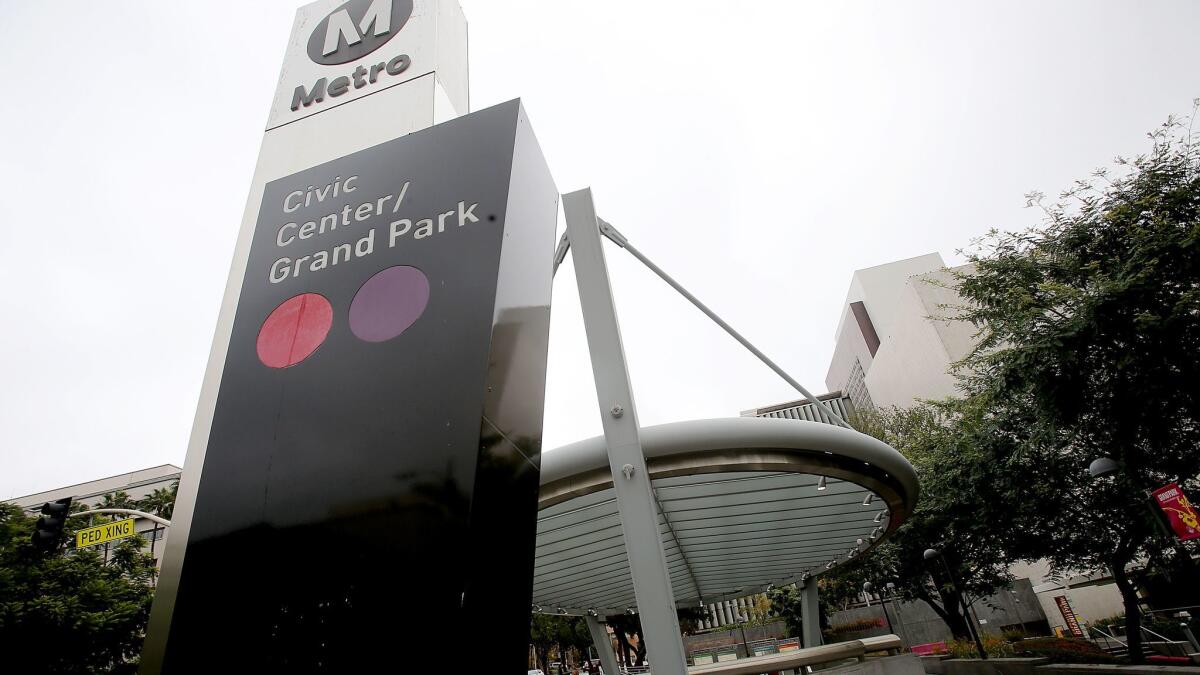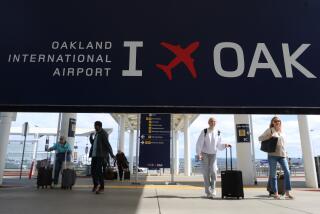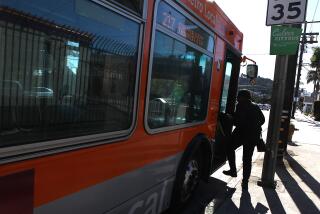Transit officials backtrack on controversial policy to sell naming rights for Metro stations

Two months after approving a controversial policy to sell naming rights to Los Angeles County’s subway stations, bus stops and other transit properties, transportation officials have overturned the plan, citing legal concerns.
The Metropolitan Transportation Authority’s board of directors voted to repeal the policy Thursday after receiving guidance from a staff attorney, who said that refusing a sponsorship deal because of a company’s business practices or political affiliation could expose Metro to lawsuits.
“As it turns out, we can’t really pick and choose,” County Supervisor Sheila Kuehl said before the vote at Metro headquarters. Opening up the names of transit stations to the highest bidder, she said, would mean extending First Amendment rights to the bidding companies, no matter their policies.
The surprise reversal marked a temporary end to the debate that has followed the policy since before its approval in December. The plan would have allowed Metro officials to sell naming rights to everything from light-rail lines and subway stations to ticketing machines, bus maintenance facilities and parking garages.
Any naming-rights agreement that would raise more than $500,000 or last longer than five years would have to be approved by Metro’s directors
Kuehl, a staunch opponent of the proposal, had raised concerns about directors choosing whether to do business with companies such as Wells Fargo, which has faced a wave of controversy over its aggressive sales tactics, including opening unauthorized accounts for millions of customers.
She eventually sought input from Metro’s attorneys to determine whether declining a proposed sponsorship would violate the bidder’s First Amendment rights.
“We couldn’t say no even based on the history of the corporation,” Kuehl said.
She noted that posters on Metro buses that advertise job openings at the U.S. Customs and Border Protection agency have distressed some immigrant riders who fear deportation. But, she said, the ads don’t violate Metro’s policies, so the agency has no choice but to accept them.
Assistant County Counsel Charles Safer agreed. At a January board meeting, he said that choosing not to do business with a company “because you don’t like their politics, or that type of reason,” could raise issues under the 14th Amendment, which requires that states guarantee equal protection of the laws to all people.
Court rulings have made it clear that public agencies can craft policies to preclude industries whose products pose a public health risk, including alcohol, tobacco and marijuana, Safer said.
Metro’s guidelines would have precluded sponsorship agreements with political and religious organizations, as well as firms that have a history of fraudulent, unethical or prejudicial behavior.
Kuehl, along with Los Angeles City Councilman and Metro director Mike Bonin, also have voiced opposition to the policy on other grounds, including the effect that changing station names could have on the ease of navigating the transit system.
The naming-rights policy was proposed as part of a broader Metro initiative to stave off long-term operating deficits.
The agency’s financial picture is now the healthiest it has been in years, following the passage of the Measure M sales tax, which will raise an estimated $120 billion during the first four decades.
Most of those funds are earmarked for transit construction or operations. Advertising revenue will remain important because it doesn’t carry the same spending restrictions as sales tax revenue, said Pauletta Tonilas, a Metro spokeswoman whose department proposed the sponsorship policy.
Tonilas added that she hasn’t ruled out pursuing the policy again in the future, although the board raised “valid concerns.”
For more transportation news, follow @laura_nelson on Twitter.
More to Read
Start your day right
Sign up for Essential California for news, features and recommendations from the L.A. Times and beyond in your inbox six days a week.
You may occasionally receive promotional content from the Los Angeles Times.







